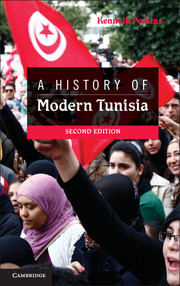Book contents
- Frontmatter
- Contents
- List of Maps
- List of Illustrations
- Acknowledgments
- A Political Who’s Who of Modern Tunisia
- Map of Tunisia
- Introduction to the Second Edition
- Introduction to the First Edition
- Chapter 1 The March to the Bardo, 1835–1881
- Chapter 2 Whose Tunisia? 1881–1912
- Chapter 3 Squaring Off, 1912–1940
- Chapter 4 Redefining the Relationship, 1940–1956
- Chapter 5 The Independent State Sets Its Course, 1956–1969
- Chapter 6 Regime Entrenchment and the Intensification of Opposition, 1969–1987
- Chapter 7 Constancy and Innovation in the “New” Tunisia, 1987–2003
- Chapter 8 A Revolution for Dignity, Freedom, and Justice
- Notes
- Suggestions for Further Reading
- Index
Chapter 1 - The March to the Bardo, 1835–1881
Published online by Cambridge University Press: 05 June 2014
- Frontmatter
- Contents
- List of Maps
- List of Illustrations
- Acknowledgments
- A Political Who’s Who of Modern Tunisia
- Map of Tunisia
- Introduction to the Second Edition
- Introduction to the First Edition
- Chapter 1 The March to the Bardo, 1835–1881
- Chapter 2 Whose Tunisia? 1881–1912
- Chapter 3 Squaring Off, 1912–1940
- Chapter 4 Redefining the Relationship, 1940–1956
- Chapter 5 The Independent State Sets Its Course, 1956–1969
- Chapter 6 Regime Entrenchment and the Intensification of Opposition, 1969–1987
- Chapter 7 Constancy and Innovation in the “New” Tunisia, 1987–2003
- Chapter 8 A Revolution for Dignity, Freedom, and Justice
- Notes
- Suggestions for Further Reading
- Index
Summary
Fiercely independent tribes with a long history of rejecting outside control inhabited the ruggedly mountainous, heavily forested area of the Tunisian-Algerian frontier. Recurrent feuds, compounded by a border that ignored many traditional tribal boundaries, rendered the region dangerously volatile. During the 1870s, the local Algerian military authorities recorded well over two thousand incidents, many of them involving incursions across the border. Thus the February 1881 ambush of a Tunisian Khmir tribesman by a group of Algerians might well have faded into oblivion with the arbitration of local notables and the payment of blood money if the confluence of French ambitions in North Africa, the willingness of other European powers to accommodate them, and the inability of the Tunisian government to impede them had not made a pretext for a military campaign in Tunisia highly desirable.
Toward the end of March, when French military administrators in La Calle, Algeria, hampered negotiations among them, the frustrated tribesmen predictably erupted into new outbreaks of violence. Asserting the need to stabilize the region, units of the French army crossed the border on April 24, capturing the garrison town of Le Kef two days later. At the same time, French warships shelled Tabarka and then sailed east to the larger and more strategically located port of Bizerte. In accordance with orders he had received from Tunis, the city’s governor surrendered on May 1 without offering any resistance. Strengthened over the following week by significant reinforcements from France, General Jules-Aimé Bréart prepared to move on Tunis itself. Persistent rain made the march longer and more difficult than anticipated, but Bréart finally reached Ksar Saʿid, the beylical palace at Bardo, on the western outskirts of the capital, on May 12. Anxious to complete his mission, he insisted on an immediate meeting with Muhammad al-Sadiq Bey, at which he and Théodore Roustan, the French consul general, demanded the ruler’s agreement – within three hours – to a document regulating Franco-Tunisian relations. In view of the overwhelming military power of France, all but one of the notables summoned to the palace as the French approached urged him to comply. The sole objection came from Larbi Zarruk, the mayor of Tunis. The Bardo Treaty acknowledged the bey’s sovereignty but placed Tunisia’s external relations under the supervision of a French resident minister and its army under the command of a French general.
- Type
- Chapter
- Information
- A History of Modern Tunisia , pp. 15 - 43Publisher: Cambridge University PressPrint publication year: 2014



